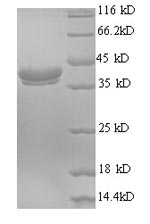Recombinant Human Ubiquitin-like FUBI-ribosomal protein eS30 fusion protein (FAU) is produced in E.coli and expressed as a full-length protein corresponding to amino acids 1-133. This product features an N-terminal GST tag, which helps with purification and detection. The protein shows purity greater than 90% as measured by SDS-PAGE, making it suitable for research applications that need high-quality reagents.
FAU protein, also called Ubiquitin-like FUBI-ribosomal protein eS30, appears to play a critical role in ribosome biogenesis and function. It's a component of the small 40S ribosomal subunit and seems to be involved in protein synthesis within cells. Understanding what FAU does in these basic processes may be essential for research into how cells grow and maintain themselves.
Potential Applications
Note: The applications listed below are based on what we know about this protein's biological functions, published research, and experience from experts in the field. However, we haven't fully tested all of these applications ourselves yet. We'd recommend running some preliminary tests first to make sure they work for your specific research goals.
FAU is a unique fusion protein where the ubiquitin-like FUBI domain must be properly processed by deubiquitinating enzymes to release functional ribosomal protein eS30. This protein requires specific folding for both domains and proper cleavage functionality. E. coli expression systems cannot replicate the eukaryotic cellular environment necessary for correct processing and may not support the proper folding of this complex fusion protein. The GST tag, while aiding solubility, may interfere with the native structure and processing requirements. No validation data (e.g., cleavage assays, ribosomal incorporation tests) are provided. Therefore, the protein's folding status and bioactivity cannot be confirmed.
1. Ribosome Biogenesis and Assembly Studies
If correctly folded and processable, the recombinant FAU could theoretically be used to study ribosome assembly, but E. coli expression is unlikely to produce a properly processed protein. If misfolded or non-cleavable, the fusion protein will not accurately represent the natural FUBI-eS30 processing pathway, leading to invalid conclusions about ribosomal incorporation mechanisms.
2. Deubiquitinating Enzyme Activity Assays
This application requires proper folding of both FUBI and eS30 domains. If correctly folded, the protein could serve as a DUB substrate, but if misfolded, enzyme cleavage studies would yield biologically irrelevant results, as the recognition and cleavage sites may be structurally compromised.
3. Protein-Protein Interaction Studies
If properly folded, GST-tagged FAU could be used for interaction studies, but if misfolded, interaction domains may be altered, leading to non-specific binding or failure to identify genuine biological partners involved in ribosome biogenesis.
4. Antibody Development and Validation
This application is suitable as antibody generation relies on linear epitopes. However, antibodies against misfolded protein may not optimally recognize the properly processed and incorporated eS30 in biological contexts.
5. Structural and Biophysical Characterization
If correctly folded, structural studies could provide insights, but if misfolded, data would misrepresent the native protein's architecture. The GST tag may dominate structural signals and interfere with accurate FAU domain analysis.
Final Recommendation & Action Plan
This E. coli-expressed GST-tagged FAU protein requires rigorous validation before functional applications. Recommended actions include: performing cleavage assays with known DUBs to verify processability; testing ribosomal incorporation capability; conducting biophysical characterization (circular dichroism, size-exclusion chromatography) to assess folding. If validation fails, consider eukaryotic expression systems that better support proper processing and folding. For reliable results, focus initial applications on antibody development and cautiously proceed with interaction studies only after confirming proper folding and processability.






